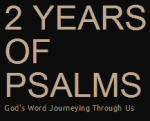 I mentioned that three words jumped out to me in this Psalm: salvation, joy, and judge. I considered salvation yesterday; joy & judge today.
I mentioned that three words jumped out to me in this Psalm: salvation, joy, and judge. I considered salvation yesterday; joy & judge today.
It seems an odd pairing: joy & judgment. When we contemplate joy, we think of exuberance, delight, freedom, happiness! Thoughts of judgment bring ideas of somber sentencing, tears, pleading, restraints, punishment, imprisonment. These two are functionally opposite ideas.
Except when the verdict is “not guilty!”
Then the courtroom becomes a party, hugs of relief and tears of joy are shared as acquittal is announced and freedom thought lost is now fully realized! Sometimes at the same time the truly guilty party is identified in the course of the trial, and his being taken into custody so that justice might finally be served only adds to the community’s joy over the innocence just proclaimed!
Joy in judgment!
Apparently, it’s possible.
Psalm 98 inextricably marries these two “opposites.” All people and all of creation are encouraged to get in on the joy-wagon (v.4-8), “for the Lord is coming to judge the earth” (v.9a).
It seems a strange reason for a party, and I can think of no one who throws a ticker-tape parade in anticipation of a coming verdict.
Yet, that’s what we’re encouraged to do.
How can we celebrate God’s act of judgment? How can we get excited about what He’s going to say, how He’s going to rule?
Because we know His character. “He will judge the world with righteousness and all the peoples with equity” (v.9). Whatever He decides, it will be right; we have no fear of needing to call for a mistrial or even file an appeal. As the Lord Himself is good, so are His judgments.
What’s more, we know the contents of His judgment. For it’s in His judging that “the Lord has made known His salvation; He has revealed His righteousness in the sight of the nations. He has remembered His lovingkindness and His faithfulness to the house of Israel; all the ends of the earth have seen the salvation of our God” (v.2-3).
God’s act of judgment is a platform for Him to show forth His righteousness, grace, mercy, love, and faithfulness. He doesn’t convict those who have been purchased and covered by the sacrifice of His Son. He doesn’t turn His back upon those who truly repent and desire to know Him. His hands aren’t bound by mandatory minimum sentencing or “three strikes and you’re out” laws. In all cases, He can exercise His Fatherhood–He is never constrained by the Law.
This doesn’t mean that there is no condemnation, or that all are acquitted. It doesn’t mean that there won’t be any tears at judgment (Luke 16:19-31; Matt 13:49-50).
But it does mean that there is an opportunity for the experience of joy in judgment. The only way it comes is to know God ahead of time, because the joy comes in knowing, anticipating, and celebrating the outcome of the verdict before it’s even pronounced…because you know Him, His character, His promises, His love, His sacrifice, His Son.